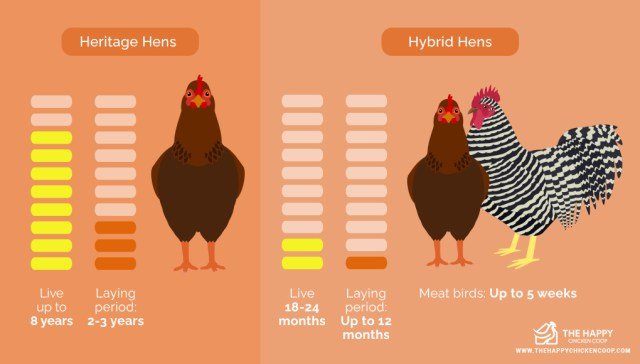
So, let’s dive into the world of poultry and explore the average lifespan of chickens, what influences it, and how to identify some key signs of aging. You might find it fascinating how closely a chicken’s life mirrors our own, with health factors playing a crucial role along the way.
Average Lifespan of Chickens
On average, chickens live between 5 to 10 years, though some can live longer with proper care. This variability often depends on the breed, living conditions, and how they’re raised. For instance, backyard chickens that roam freely tend to live longer than those kept in commercial farms. Imagine living in a cozy home where you can roam the yard versus being cooped up in a cramped space—it’s a no-brainer!
Some heritage breeds, like the *Rhode Island Red* or *Plymouth Rock*, often reach the upper end of that lifespan. Conversely, hybrid layers designed for egg production, such as the *Leghorn*, may live shorter lives due to the demands of high egg production. Overall, understanding your chicken’s breed can give you a better idea of its lifespan.
Factors Influencing Chicken Lifespan
Chicken longevity isn’t just a random number; it’s influenced by several important factors.
- Breed Selection: Different breeds have varying lifespans. Heritage breeds generally outlive commercial hybrids.
- Living Conditions: Chickens in healthy, spacious environments are more likely to thrive compared to those in cramped quarters.
- Diet: A balanced diet rich in nutrients contributes significantly to a chicken’s overall health and lifespan.
- Healthcare: Regular vet check-ups, vaccinations, and preventive care help catch potential problems early.
Think of it like raising kids: if they have a nutritious diet, a safe home, and regular check-ups, they’re likely to grow up strong and healthy. The same principle applies to chickens!
Signs That Your Chicken Is Aging
Just like us, chickens show signs of aging that can help you determine their health and lifespan. You might be wondering what to look for, so here are some common aging signs.
1. Feather Condition: Older chickens often have faded or ragged feathers. Youthful birds display vibrant, shiny plumage. If your chicken’s feathers look worn out, it may be a sign of age.
2. Egg Production Changes: As chickens age, their egg-laying frequency decreases. A healthy hen might lay eggs daily in her prime but can drop to just a few a week as she gets older.
3. Behavioral Changes: You might notice that older chickens are less active. They might not scratch around as eagerly as younger ones and may prefer to roost rather than forage.
4. Physical Appearance: Look out for signs like a paler comb or wattles, which can indicate aging. Also, check their posture—older chickens may stand a bit hunched.
Being aware of these signs can help you provide better care for your aging flock.
How to Extend Your Chicken’s Lifespan
You want your feathered friends to live long and happy lives, right? Here are some practical tips to help extend your chicken’s lifespan.
– Balanced Diet: Provide a nutritious diet that includes a mix of grains, greens, and protein. This keeps them strong and healthy.
– Clean Living Environment: Regularly clean their coop and ensure they have enough space to roam. Fresh air and clean surroundings can prevent many illnesses.
– Routine Health Checks: Keep an eye on their behavior and physical appearance. Early detection of health issues can lead to better outcomes.
– Socialization and Space: Chickens are social creatures. Ensure they have enough space to socialize and explore. It’s like giving them a mini vacation every day!
Taking these steps can make a huge difference in how long your chickens live and how vibrant their lives can be.
Common Health Issues That Affect Lifespan
While providing the best care helps, you should also be aware of common health issues that can impact your chickens’ lifespans.
– Respiratory Diseases: Chickens can be prone to respiratory infections. Keeping their coop well-ventilated can help prevent these issues.
– Parasites: Worms and mites can affect their health significantly. Regular deworming and pest control are essential.
– Nutritional Deficiencies: If your chickens don’t get the right nutrients, they can develop serious health issues. Ensure you’re offering a balanced diet.
Taking proactive steps and staying informed about these health challenges means you can help your chickens live longer, healthier lives.
Understanding Chicken Aging in the Context of Production
If you’re raising chickens for eggs or meat, understanding their lifespan and aging process is crucial for managing your flock effectively.
– For Egg Layers: Most hens are productive for about 2-3 years. After that, they may still be alive, but their egg production will decline significantly. You might consider culling older hens to make room for younger ones.
– For Meat Birds: Broilers are usually processed at a young age—around 6 to 8 weeks—so the lifespan factor is often less relevant here. However, knowing how quickly they age helps you plan your flock turnover.
Understanding these aspects ensures you’re making informed choices about your flock and their productivity.
Emotional Connection and Bonding With Lifespan Awareness
Chickens have personalities that can endear them to their owners. Many people form a strong bond with their birds, which makes it even harder when they start to show signs of aging.
It can be helpful to embrace the journey with your chickens. Spend time with them, observe their quirks, and appreciate the life they bring to your home. Recognizing that their lifespan is finite can deepen your relationship, making you more attentive to their needs as they age.
In the end, treating your chickens not just as livestock but as companions can enrich both your lives.
As you can see, understanding how long chickens live involves looking at various aspects of their life and care. By offering a supportive environment, balanced nutrition, and being attentive to their needs, you can ensure your feathered friends live happy and fulfilling lives. There’s something truly rewarding about watching them thrive—and knowing you’re playing a part in it.
